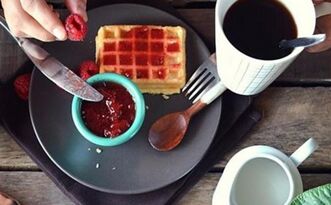1个月不吃甜食会怎样?竟然性情大变
In neuroscience, food is something we call a "natural reward". In order for us to survive as a species, things like eating must be pleasurable to the brain so that these behaviours are reinforced and repeated.
在神经科学中,我们称食物为“自然奖励”。为了让我们作为一个物种生存下来,像吃饭这样的事情必须让大脑愉悦,这样这些行为才能得到强化和重复。
Not all foods are equally rewarding, of course. Most of us prefer sweets over sour and bitter foods because, evolutionarily, our mesolimbic pathway reinforces that sweet things provide a healthy source of carbohydrates for our bodies.
当然,并非所有的食物都有同样的回报。我们大多数人喜欢甜食而不是酸的和苦的食物,因为从进化上讲,我们的中边缘通路不断加固甜食为我们的身体提供健康碳水化合物。
Anyone who knows me also knows that I have a huge sweet tooth. My friend and fellow graduate student Andrew is equally afflicted, and living in Hershey, Pennsylvania – the "Chocolate Capital of the World" – doesn't help either of us.
认识我的人都知道我超爱吃甜食。我的研究生朋友安德鲁也深受其苦,住在“巧克力世界之都”宾夕法尼亚州的好时市也没帮上我俩什么。

But Andrew is braver than I am. Last year, he gave up sweets for Lent.
但安德鲁比我有魄力。去年,他为了四旬斋戒了糖果。
"The first few days are a little rough," Andrew told me about his sugar-free adventure last year.“
前几天有点难熬,”安德鲁告诉我他去年的无糖尝试。
"It almost feels like you're detoxing from drugs. I found myself eating a lot of carbs to compensate for the lack of sugar."
“感觉就像在戒毒。我发现自己吃了很多碳水化合物来弥补糖的不足。”
In short, this means that repeated access to sugar over time leads to prolonged dopamine signalling, greater excitation of the brain's reward pathways and a need for even more sugar to activate all of the midbrain dopamine receptors like before.
简而言之,这意味着长时间内反复接触糖会导致多巴胺信号延长,大脑的奖励通道更为兴奋,要像以前激活所有的中脑多巴胺受体一样的效果需要更多的糖。
The brain becomes tolerant to sugar – and more is needed to attain the same "sugar high".
大脑对糖的耐受性越来越强,达到同样的“糖嗨”需要更多的糖。
But after 40 days, it's clear that Andrew had overcome the worst, likely even reversing some of his altered dopamine signalling. "I remember eating my first sweet and thinking it was too sweet," he said. "I had to rebuild my tolerance."
但40天后,安德鲁显然已经克服了最糟的情况,甚至可能逆转了他延长的多巴胺信号。”他说:“我记得我之后第一次吃甜食时,觉得太甜了。”我必须重建我的耐甜度。”